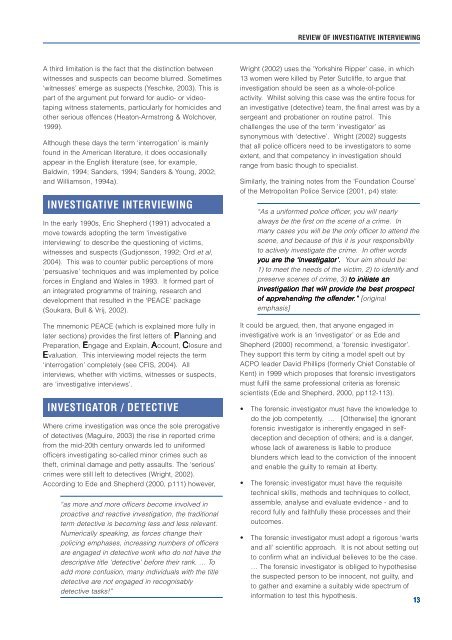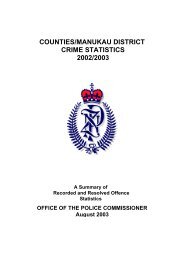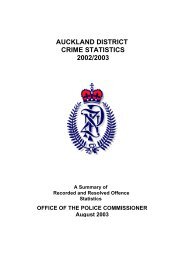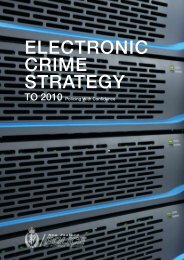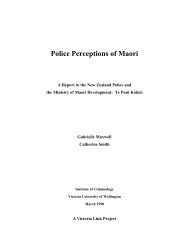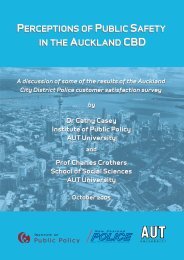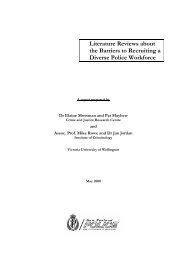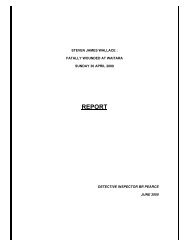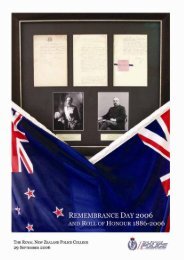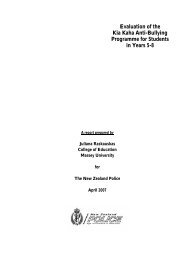Investigative interviewing: the literature - New Zealand Police
Investigative interviewing: the literature - New Zealand Police
Investigative interviewing: the literature - New Zealand Police
You also want an ePaper? Increase the reach of your titles
YUMPU automatically turns print PDFs into web optimized ePapers that Google loves.
REVIEW OF INVESTIGATIVE INTERVIEWING<br />
A third limitation is <strong>the</strong> fact that <strong>the</strong> distinction between<br />
witnesses and suspects can become blurred. Sometimes<br />
‘witnesses’ emerge as suspects (Yeschke, 2003). This is<br />
part of <strong>the</strong> argument put forward for audio- or videotaping<br />
witness statements, particularly for homicides and<br />
o<strong>the</strong>r serious offences (Heaton-Armstrong & Wolchover,<br />
1999).<br />
Although <strong>the</strong>se days <strong>the</strong> term ‘interrogation’ is mainly<br />
found in <strong>the</strong> American <strong>literature</strong>, it does occasionally<br />
appear in <strong>the</strong> English <strong>literature</strong> (see, for example,<br />
Baldwin, 1994; Sanders, 1994; Sanders & Young, 2002;<br />
and Williamson, 1994a).<br />
INVESTIGATIVE INTERVIEWING<br />
In <strong>the</strong> early 1990s, Eric Shepherd (1991) advocated a<br />
move towards adopting <strong>the</strong> term ‘investigative<br />
<strong>interviewing</strong>’ to describe <strong>the</strong> questioning of victims,<br />
witnesses and suspects (Gudjonsson, 1992; Ord et al,<br />
2004). This was to counter public perceptions of more<br />
‘persuasive’ techniques and was implemented by police<br />
forces in England and Wales in 1993. It formed part of<br />
an integrated programme of training, research and<br />
development that resulted in <strong>the</strong> ‘PEACE’ package<br />
(Soukara, Bull & Vrij, 2002).<br />
The mnemonic PEACE (which is explained more fully in<br />
later sections) provides <strong>the</strong> first letters of: Planning and<br />
Preparation, Engage and Explain, Account, Closure and<br />
Evaluation. This <strong>interviewing</strong> model rejects <strong>the</strong> term<br />
‘interrogation’ completely (see CFIS, 2004). All<br />
interviews, whe<strong>the</strong>r with victims, witnesses or suspects,<br />
are ‘investigative interviews’.<br />
INVESTIGATOR / DETECTIVE<br />
Where crime investigation was once <strong>the</strong> sole prerogative<br />
of detectives (Maguire, 2003) <strong>the</strong> rise in reported crime<br />
from <strong>the</strong> mid-20th century onwards led to uniformed<br />
officers investigating so-called minor crimes such as<br />
<strong>the</strong>ft, criminal damage and petty assaults. The ‘serious’<br />
crimes were still left to detectives (Wright, 2002).<br />
According to Ede and Shepherd (2000, p111) however,<br />
“as more and more officers become involved in<br />
proactive and reactive investigation, <strong>the</strong> traditional<br />
term detective is becoming less and less relevant.<br />
Numerically speaking, as forces change <strong>the</strong>ir<br />
policing emphases, increasing numbers of officers<br />
are engaged in detective work who do not have <strong>the</strong><br />
descriptive title ‘detective’ before <strong>the</strong>ir rank. … To<br />
add more confusion, many individuals with <strong>the</strong> title<br />
detective are not engaged in recognisably<br />
detective tasks!”<br />
Wright (2002) uses <strong>the</strong> ‘Yorkshire Ripper’ case, in which<br />
13 women were killed by Peter Sutcliffe, to argue that<br />
investigation should be seen as a whole-of-police<br />
activity. Whilst solving this case was <strong>the</strong> entire focus for<br />
an investigative (detective) team, <strong>the</strong> final arrest was by a<br />
sergeant and probationer on routine patrol. This<br />
challenges <strong>the</strong> use of <strong>the</strong> term ‘investigator’ as<br />
synonymous with ‘detective’. Wright (2002) suggests<br />
that all police officers need to be investigators to some<br />
extent, and that competency in investigation should<br />
range from basic though to specialist.<br />
Similarly, <strong>the</strong> training notes from <strong>the</strong> ‘Foundation Course’<br />
of <strong>the</strong> Metropolitan <strong>Police</strong> Service (2001, p4) state:<br />
“As a uniformed police officer, you will nearly<br />
always be <strong>the</strong> first on <strong>the</strong> scene of a crime. In<br />
many cases you will be <strong>the</strong> only officer to attend <strong>the</strong><br />
scene, and because of this it is your responsibility<br />
to actively investigate <strong>the</strong> crime. In o<strong>the</strong>r words<br />
you are e <strong>the</strong> ‘investigator’. Your aim should be:<br />
1) to meet <strong>the</strong> needs of <strong>the</strong> victim, 2) to identify and<br />
preserve scenes of crime, 3) to initiate an<br />
investigation that will provide <strong>the</strong> best prospect<br />
of apprehending <strong>the</strong> offender<br />
fender.”<br />
.” [original<br />
emphasis]<br />
It could be argued, <strong>the</strong>n, that anyone engaged in<br />
investigative work is an ‘investigator’ or as Ede and<br />
Shepherd (2000) recommend, a ‘forensic investigator’.<br />
They support this term by citing a model spelt out by<br />
ACPO leader David Phillips (formerly Chief Constable of<br />
Kent) in 1999 which proposes that forensic investigators<br />
must fulfil <strong>the</strong> same professional criteria as forensic<br />
scientists (Ede and Shepherd, 2000, pp112-113).<br />
• The forensic investigator must have <strong>the</strong> knowledge to<br />
do <strong>the</strong> job competently. … [O<strong>the</strong>rwise] <strong>the</strong> ignorant<br />
forensic investigator is inherently engaged in selfdeception<br />
and deception of o<strong>the</strong>rs; and is a danger,<br />
whose lack of awareness is liable to produce<br />
blunders which lead to <strong>the</strong> conviction of <strong>the</strong> innocent<br />
and enable <strong>the</strong> guilty to remain at liberty.<br />
• The forensic investigator must have <strong>the</strong> requisite<br />
technical skills, methods and techniques to collect,<br />
assemble, analyse and evaluate evidence - and to<br />
record fully and faithfully <strong>the</strong>se processes and <strong>the</strong>ir<br />
outcomes.<br />
• The forensic investigator must adopt a rigorous ‘warts<br />
and all’ scientific approach. It is not about setting out<br />
to confirm what an individual believes to be <strong>the</strong> case.<br />
… The forensic investigator is obliged to hypo<strong>the</strong>sise<br />
<strong>the</strong> suspected person to be innocent, not guilty, and<br />
to ga<strong>the</strong>r and examine a suitably wide spectrum of<br />
information to test this hypo<strong>the</strong>sis.<br />
13


